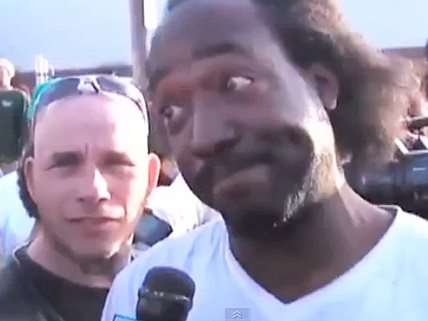Neighborhood Man Saves Kidnapped, Captive Women; Police Fight War on Drugs
What's police work?


Three women who were kidnapped and held in captivity for nearly a decade in Cleveland were finally rescued after a neighbor, Charles Ramsey, saw one of the women trying to escape and went to the porch. Ramsey says the woman, Amanda Berry, asked him for help and figuring it was some kind of "domestic dispute," he helped. Police found two other women imprisoned in the home and arrested three brothers, since charging one, Ariel Castro, with kidnapping and rape. "I knew something was wrong when a little pretty white girl ran into a black man's arms," Ramsey told a reporter in an interview that's gone viral. Ramsey, who has a history of domestic violence he says helped him grow into a better person, was not the first person to see something strange at the house, just the first one who went and did something about it. USA Today reports that several neighbors said they called police about the Castro home, the windows of which were covered with plastic, several times; including once after a girl said she saw a naked woman on her hands and knees in the backyard and another after someone heard banging at the doors from inside the home. Police acknowledge coming to the home twice, but the police chief says he's "absolutely sure" police did everything they could to find the women.
Faced with an $8 million deficit at the start of this year, the mayor of Cleveland warned budget cuts would eliminate the narcotics unit. What's that unit done in the last few years? They found a warehouse full of marijuana plants last November and in June an FBI-coordinated drug raid involved 350 law enforcement officials and 70 arrests. There was a bust of a prescription drug ring last March. Cleveland police made their biggest drug bust in history in February 2009, seizing 3000 pounds of marijuana and $386,000 in cash and making 8 arrests. They seized 700 pounds the February before that and in 2007 busted a six-year veteran of the police department trafficking cocaine from Mexico.
At the crux of the drug war is the victimless crime of narcotics possession and use (and the sales that make that voluntary possession and use possible, tied to which are the weapons needed because of the business' illegal status). Billions have been spent on law enforcement around the country to combat an essentially private, voluntary choice. Alternet ran a piece this morning explaining some of the perverse benefits for police to going after drug crimes instead of kidnapping, rape and slavery. The rescue of three women by a passer-by from a home police had been alerted to multiple times (and which was apparently occupied by the father of one of the girl's self-described "best friends"), coupled with incidents like the suspected Boston bomber being spotted not by a massive manhunt but by a homeowner having a cigarette in his backyard and the thwarting of the Times Square bombing not by the heavily-armed and stationary police officers in the area but by local vendors going about their business suggests it's not money or even manpower but good, alert police work that can solve and stop crimes. Instead, fueled by the militarization of police and the war on drugs, the beat cop's disappearing while the war on what goes in your body continues, violently.


Show Comments (187)